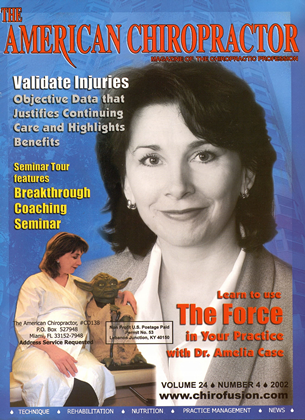What should I consider after reviewing the brochures, prices and specifications? Some important differences are in the manufacturing, materials and the factory's quality program. It is important to test the knowledge of the manufacturer's X-ray expertise, if you can. What's their main focus: veterinary, medical, ■ mammography, chiropractic, etc! Most companies have a niche product in one or two areas. Finding a company that specializes in chiropractic equipment usually translates to an importance placed on specific products and special customer needs. Also, make sure you compare apples to apples, when looking at quotes from each company. Why are materials important? The structural materials of the equipment can vary from thin sheet metals and plastic to sound ridged steel and aluminum castings. Also, the quality of the painted products can vary from air-dry enamel to baked-on powder coatings. This is all very important when considering the years of usage expected from your investment. How will your X-ray system survive a rc-location; and what about its long-term appearance? | Factory Quality Programs: What's the difference? Manufacturers of X-ray machines used on humans must meet federal regulations (FDA), veterinary systems do not need to. Certification from UL (underwriter laboratories) or ETL (environmental testing labs) is also important for safety and immunity to line voltage dips and surges. The big difference is the calibration process and tube quality. The calibration process is time consuming and expensive, so manufacturers can opt to pre-calibrate, using only an in-house test X-ray tube, leaving the final calibration up to the installer at your site. This means your X-ray tube and high voltage cables were never connected and tested with your generator. Most installers will try to get the job done in 8 hours or less, so they rush the calibration process of your X-ray equipment. And what about the calibration of their test equipment? If you purchase factory-calibrated equipment to your X-ray tube and cables, it will be more accurate and consistent when it is installed in your office. The mil-liroentgcn (mR) value for anatomical exposures is matched for best film quality also. Q: How long has the manufacturer been in business? A: A manufacturer that has been in business for a short period of time may not have all of the bugs worked out. The longer a manufacturer has been in business producing the same line of quality equipment, the more opportunity they've had to make sure they have an electrical design that works day-in and day-out. Additionally, the dealer network is established and will be there to support you and your needs Manufacturers that have been in business, for a period of time will also have a larger customer base and a good professional reputation. You should talk to a few colleagues in the area you intend to practice and make sure they have been happy with their X-ray equipment and any service after the sale. Q: How long is the warranty period and what parts/service is A: protected under the warranty contract? Some X-ray manufacturers only provide a one-year warranty on parts and labor. Others offer a 5-ycar warranty for the same coverage. Most companies offer a one-year prorated warranty on the X-ray tube. Q: Are anatomical programs available, and how easily are A: they changed? Some X-ray equipment does not offer anatomical programming. This feature allows you to select an anatomical part (e.g,. specific cervical spine projection) from the X-ray control, enter the body part measurement, and a radiographic technique (kVp and mAs) will be suggested. Without anatomical programming, you would have to measure your patient and then consult a technique chart, which is time-consuming to put together, requires technological expertise and can be very inaccurate. Dr. Terry R. Yochum is a second-generation chiropractor and a cum laude graduate of the National College of Chiropractic, where he subsequently completed his radiology specialty. He is currently Director of the Rocky Mountain Chiropractic Radiological Center, in Denver, CO, an Adjunct Professor of Radiology at the Los Angeles College of Chiropractic, as well as Professor of Radiology at the Colorado College of Chiropractic at Marycrest University, Denver, CO. Dr. Yochum is, also, a consultant for Virtu-Rad, a digital imaging and health care manufacturing company that offers a Stored Energy system. For more information, Dr. Yochum can be reached at: (303) 940-9400 or by e-mail at dcrad099(a)aol.com. \ Editor's Note: If you have anv questions about X-ray technology, fax or leave a voice mail at 1-305-716-9212, or e-mail Jaelyn((i)amchiropractor.com.
 View Full Issue
View Full Issue












